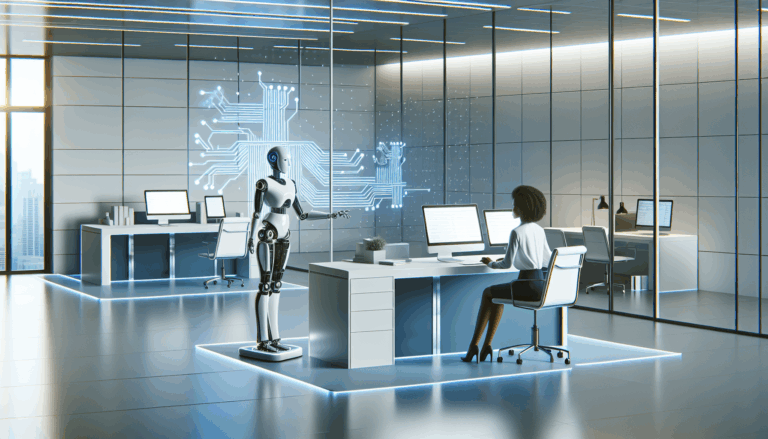The Rising Role of AI in the Modern Workplace
Artificial Intelligence (AI) has rapidly transformed from a futuristic concept into an essential component of today’s workplace. The integration of AI in offices globally is reshaping how tasks are performed, driving efficiency, and enhancing overall productivity. As companies embrace AI technology, it’s becoming clear that AI is not just a tool but a strategic partner in the modern workplace setting.
AI Productivity: Enhancing Efficiency and Output
One of the most immediate benefits of AI in the workplace is its ability to boost productivity. AI-powered software automates repetitive and mundane tasks, allowing employees to focus on higher-value activities that require creativity, critical thinking, and emotional intelligence. For example, AI algorithms can handle data entry, schedule meetings automatically, and even manage emails by prioritizing and categorizing messages.
AI also supports decision-making processes with real-time data analysis and predictive insights. In industries ranging from finance to marketing, AI tools analyze large datasets much faster than humans, providing actionable insights and trends that help managers make better decisions. According to a report by McKinsey, organizations that effectively utilize AI in their workflows can see productivity gains of 20-25%, underscoring the transformative potential of AI productivity tools.
AI Prompts: Revolutionizing Communication and Creativity
AI prompts have revolutionized how employees interact with technology in the office. These prompts, often embedded in AI-powered chatbots or virtual assistants, can assist with a plethora of tasks. From generating content suggestions to helping with coding or providing instant customer service responses, AI prompts make interactions smoother and more efficient.
In creative workplaces, AI prompts offer inspiration and new ideas. Writers, designers, and marketers leverage AI to brainstorm, generate drafts, and refine their work. The advantage is not just speed but also the diversity and quality of output, as AI can suggest novel approaches based on patterns it has learned from vast datasets.
AI Training: Preparing the Workforce for the Future

As AI becomes deeply embedded in office environments, AI training is crucial for employees and management alike. Proper AI training programs enable staff to understand how to work alongside AI tools effectively and ethically. This training encompasses everything from basic AI literacy—understanding what AI can and cannot do—to hands-on workshops on specific AI applications relevant to their roles.
Companies investing in AI training also focus on change management to reduce resistance and anxiety about AI replacing human jobs. Instead, they emphasize that AI is a complementary technology designed to enhance human skills. Training ensures that employees can optimize AI tools while maintaining control and oversight, promoting a healthy synergy between man and machine.
The Office of Tomorrow: AI-Driven Workplaces
Incorporating AI into the office environment also includes smart infrastructure upgrades. Intelligent office systems powered by AI can regulate lighting, temperature, and even security to create more comfortable and secure workspaces. AI-driven analytics assess workplace usage trends, helping businesses design spaces that foster collaboration, creativity, and wellbeing.
Remote work arrangements, which have become common, benefit tremendously from AI as well. AI tools facilitate virtual meetings with real-time language translation, automated note-taking, and task tracking, helping remote teams stay connected and productive regardless of geography.
Challenges and Ethical Considerations in AI at Work
While AI presents significant advantages, it also raises important challenges in the workplace. The reliance on AI prompts and automation can sometimes lead to overdependence, where employees might lose critical skills or judgment. Addressing this requires balanced AI training programs emphasizing human oversight and continuous learning.
Ethical considerations are paramount. Transparency about how AI algorithms make decisions, protecting employee data privacy, and managing biases in AI models are ongoing concerns. Workplaces must develop clear policies and governance frameworks to ensure AI is deployed responsibly.
“AI is not about replacing jobs but augmenting human capabilities—empowering workers to achieve more and innovate further,” notes a leading AI ethics expert.
Looking Ahead: The Future of AI in Workplaces
The trajectory of AI in the workplace suggests increasingly sophisticated collaboration between humans and machines. AI will likely take on more complex cognitive tasks, while humans focus on areas where empathy, intuition, and ethical judgment are critical.
Organizations that invest in comprehensive AI training and cultivate a culture of continuous adaptation will be best positioned to harness AI’s full potential. The office of the future will be a dynamic environment where AI productivity tools and human ingenuity work hand in hand to boost performance, creativity, and job satisfaction.
AI’s integration into the workplace is a journey, not a destination. Embracing this change with openness and preparedness will ensure that AI serves as a powerful asset in creating smarter, more resilient offices across the globe.
Get started today with Responsible use of AI license training.

